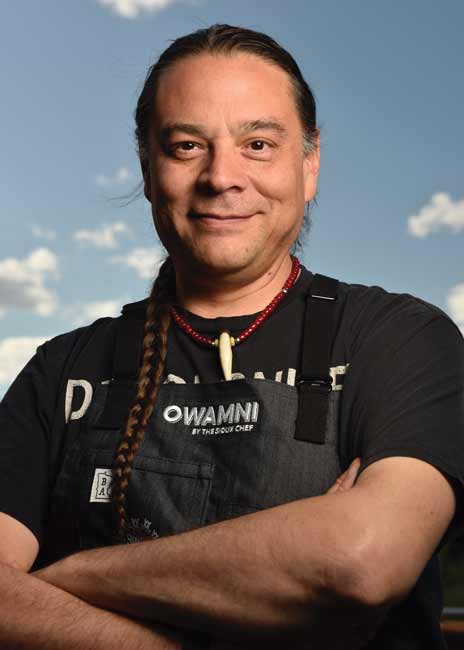After nearly two decades spent working his way up through the kitchens of top Minneapolis restaurants, Chef Sean Sherman had an epiphany.
 Chef Sean ShermanFor all its culinary diversity, he saw a U.S. food industry devoid of knowledge about indigenous foods and foodways, and likewise did not embrace indigenous practices. An Oglala Lakota Sioux who was raised on the Pine Ridge Indian Reservation in South Dakota, largely on a non-Native diet of government-supplied commodities, Sherman has since become a changemaker, educator and advocate for reestablishing Native foodways and inspiring indigenous food entrepreneurs.
Chef Sean ShermanFor all its culinary diversity, he saw a U.S. food industry devoid of knowledge about indigenous foods and foodways, and likewise did not embrace indigenous practices. An Oglala Lakota Sioux who was raised on the Pine Ridge Indian Reservation in South Dakota, largely on a non-Native diet of government-supplied commodities, Sherman has since become a changemaker, educator and advocate for reestablishing Native foodways and inspiring indigenous food entrepreneurs.
In 2014, he founded The Sioux Chef, offering catering and pop-up dinners focused on indigenous foods. In 2017, he released “The Sioux Chef’s Indigenous Kitchen,” which won the 2018 James Beard Foundation Best American Cookbook award. In 2020, he co-founded the nonprofit North American Traditional Indigenous Foods Systems (NATIFS), which works with tribal communities nationwide, and the indigenous Food Lab, a teaching kitchen in Minneapolis’ Midtown Global Market. In 2021, Sherman brought his vision for an indigenous restaurant to life. Owamni by The Sioux Chef uses natural, healthful ingredients from the precolonial Native American pantry; it supports BIPOC (Black, Indigenous and People of Color) suppliers; and 70% of its 130-member staff identify as indigenous. Owamni was named Best New Restaurant of 2022 by the James Beard Foundation.
The mission, Sherman says, is to create access to healthy indigenous food and education. “We want to make big changes around how people think about food and how communities can work together toward better, more culturally and regionally relevant food systems, especially in tribal communities.”
Owamni, he adds, is “proof of concept that it’s possible to have a very intentionally decolonized restaurant in today’s world. We want to model what’s possible for other Native food entrepreneurs.”
That, he says, despite ongoing barriers that marginalized groups often face. “Historically, except for in the back of house, the culinary world hasn’t been very diverse,” Sherman says. “And based on my own experiences, the culture in the back of house can be pretty toxic for women and people of color. No matter how talented they are, many people of color also don’t have the financial resources and training it takes to open and run businesses. There’s a lot of work that needs to be done, but having conversations helps create awareness around the need for change.”
Sherman advocates thinking outside the box to provide employees with support resources — he hired a psychiatrist to work with staff members suffering from trauma or mental health issues — and creating a workplace culture built on respect and collaboration. “The restaurant industry is for-profit and traditionally top-down. That’s understandable. But it’s also important to have group conversations, to listen to all employees to understand their perspective and take a fresh look at culture. We’ve been stuck in a broken system for a long time. Now is a great time to make change.”
Chef Sean Sherman
Founder/CEO, The Sioux Chef, Founder/Senior Director of Vision & Strategic Partnerships
NĀTIFS (North American Traditional Indigenous Food Systems) Co-Owner, Owamni by The Sioux Chef




